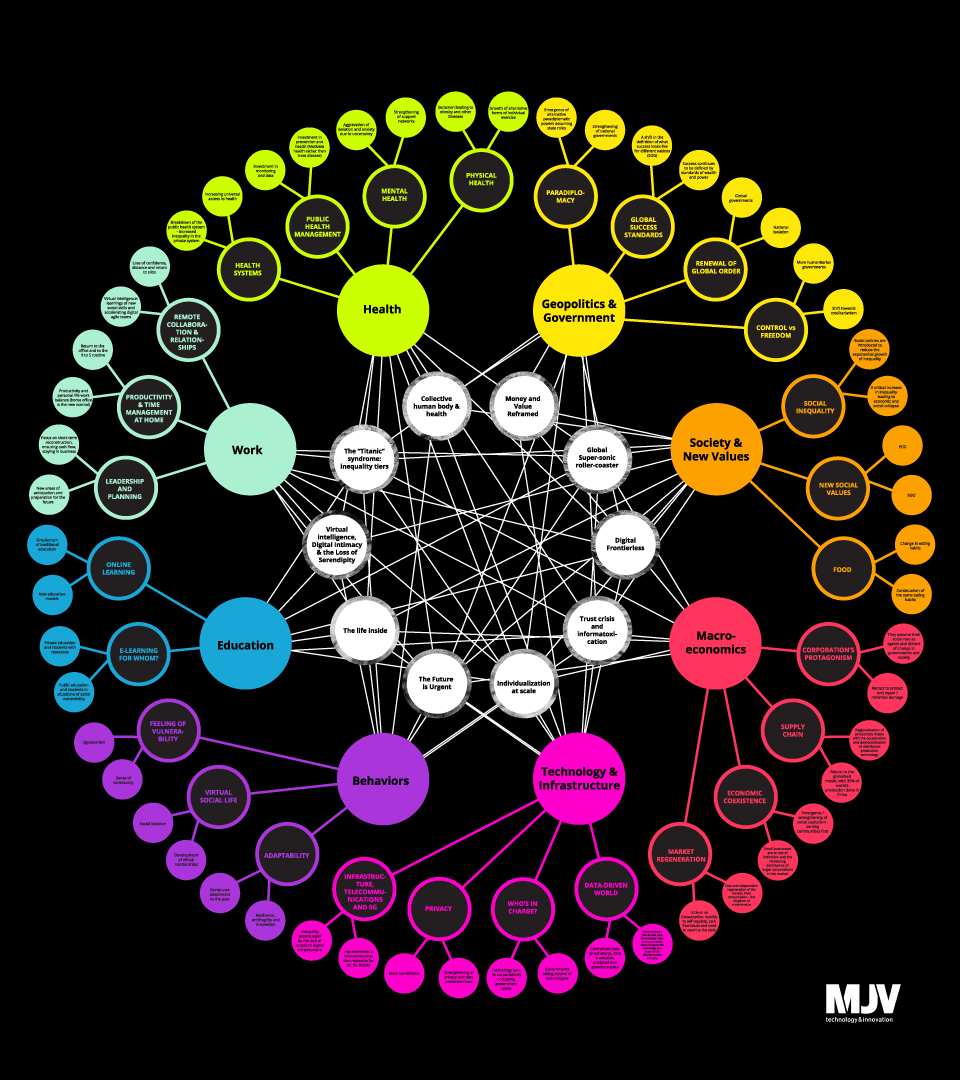If you ask leading consulting firm MJV Technology & Innovation about the new normal, they’ll tell you one thing for certain—every aspect of life is now open for discussion and businesses need to innovate to adapt. That’s the only certainty we can truly rely on.
The year 2020 has been anything but normal, in fact, MJV believes that 2020 was the first, punctuated mark of the new, post-normal era. Most of what we knew to be routine was turned upside down—almost overnight.
The coronavirus pandemic changed much—the way we communicate and interact, the way the world looks at unlikely and improbable circumstances, the way we do business, buy goods and services, receive education, and work.
In an era of new normal that’s currently under construction, the questions that surround our uncertainties about how to proceed seem unending.
Admittedly, MJV knows there’s no one-way, one-size-fits-all answer to any of these questions.
They are a data-driven innovation hub that focuses on solutions that transform numbers, data, and research into applicable business insights. In other words, they’re professional analysts and strategists who offer companies and business leaders real solutions to the very tangible problems that arise in our world—both routine, everyday issues as well as the improbable, unlikely ones.
In an effort to assist and guide companies and individuals navigate the new normal, as well as the new choices they’d need to make in a future that’s under construction, MJV conducted extensive research, aptly titled The New Normal, which results in the creation of what they termed the Futures Wheel, a visual diagram of the uncertainties and drivers that are playing the biggest role in our new normal.

As the founder of Leave Normal Behind, a social impact movement and modern-day renaissance network, I am always speaking with individuals who are becoming the best version of themselves, encouraging others to do the same, and innovating to solve some of the world’s biggest problems.
Recently, I had the opportunity to sit down and discuss the MJV research on the New Normal, their Futures Wheel, and the notion of divergent paths, uncertainties, and the new era of driving change to help build a desirable future.
Together, we discuss one of the largest questions that MJV has set out to meet with some semblance of an answer—what will business look like in this unique age of new-normal?
In your opinion and according to MJV research, which functions of a business were most impacted by the New Normal?
Mauricio Vianna: The first thing I believe we need to define here is what exactly is the new normal. The new normal would be the time we are in—where the pandemic happened and coronavirus happened—but no vaccine has been created yet.
It’s hard to say what or who has not been impacted, as WFH dramatically changed the landscape, but we can name some functions of the business that suffered a more dramatic impact.
First, the production and supply chain areas—especially factories—were mostly impacted where people had to be physically there. Secondly, as WFH struck, all IT areas had to work overtime to keep servers, networks, and infrastructures up to speed to meet the new connectivity needs.
Now that businesses have to work against the clock to go digital, those areas are still under tremendous pressure to develop digital solutions that are user-friendly and functional to keep the businesses going. But marketing, IT, those are knowledge types of work, which you know, people can work from home and not necessarily, have been affected.
What are three of the most significant changes to how businesses operate that have been most commonly felt across most industries?
MV: Digitalization: for organizational processes as well as for consumer interfaces, we all had to “go digital” to some extent. Being that working from home, turning your store into e-commerce, or fitting all bank services into an app, the pandemic might have started in the physical world, but it sure did accelerate the digital transformation of companies.
A Sense of Urgency: With the pandemic, all the companies increased their sense of urgency for producing what’s necessary, focusing a lot on their core products, making sure they will survive this crisis, prioritizing services or products that generate their most cash flow.
IT as a Strategic Role: Regardless of the industry, the adaptations needed for people to continue to work and produce at the office or from home had a substantial impact in all sectors. However, many organizations did transition to the new norm in a relatively intuitive or improvised way – all thanks to the IT dept. In fact, most companies have been able to continue to operate with their IT development and production teams remaining remote most of the time.
What advantages does the New Normal provide for innovation and improving customer experience?
MV: For starters, the idea that “digital is boardless.” The new normal has accelerated the digital transformation inside corporations and this had a significant impact in terms of innovation, bringing digital capabilities to business operations.
This “new normal” forced companies to bring in new technologies and new ways of working and interacting with their customers. For instance, when digitally interacting with consumers, businesses have the flexibility of designing personalized digital environments and change them according to the type of customer.
Secondly, the concept of “the life inside.” Life and consumption, moved from out-of-home (offices, schools, restaurants, cinemas, parks, etc.) to in-home, increasing the opportunity to in-house solutions that improve aspects of home-dwelling.
Finally, “Virtual Intelligence, Digital intimacy and The Loss of Serendipity.” As relationships went digital and our in-person interactions became scarcer, a stronger need emerged for digital solutions that focus on community building and interaction. As humans are, by nature, a gregarious species, communities, both digital and physical, will continue to play a big role in our lives.
Are there any business practices that could be permanently dead in the New Normal?
MV: I am not going as far as declaring practices dead altogether, but there have been businesses that one can say will be forever shifted. It is already happening, especially within the travel industry, the hotel businesses, and commercial real-estate – all have been severely affected.
In the new normal, where most people are working from home, the need for bigger spaces or co-working spaces will definitely diminish but won’t be dead because there’s still the need for people to interact to socialize. It will be a matter of evolution and adaptation.
The same with retail stores, restaurants, banks, cinemas, theaters, and all these businesses that do not allow for social distancing will diminish until we get a vaccine.
Indeed the greatest takeaway from my interview with MJV was the value business leaders and entrepreneurs must place on digital transformation and the use of strategic technology to meet the demands of the new marketplace.
Whether it’s adapting to remote work, innovating new business processes or strategizing on contactless delivery of products and services for customers, no business model can neglect what the Futures Wheel is demonstrating loud and clear.


